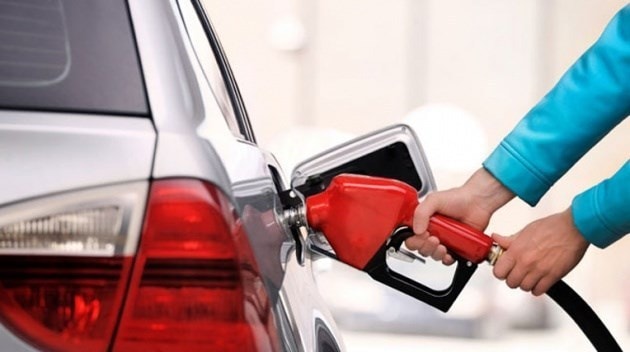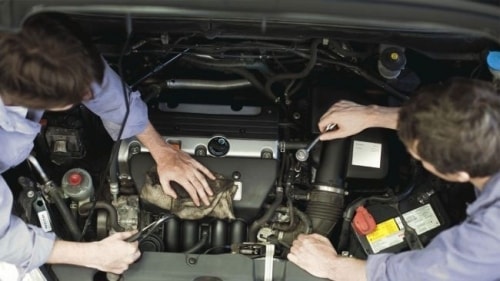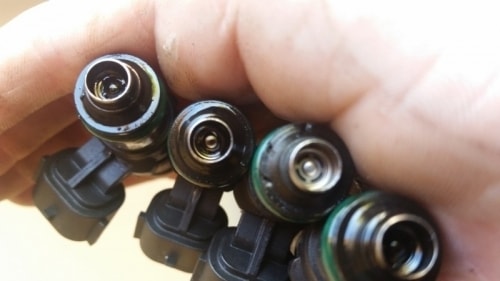How harmful is 'dirty' gasoline to cars?
(Baonghean.vn) - Cars using fuel containing impurities (dirty gasoline) for a long time can cause the engine to overheat, the car to become sluggish, and can even lead to fire or explosion, causing danger and damage to consumers.
The situation of cars using dirty gasoline often comes from objective causes. Therefore, when the car has unusual signs when operating, the driver will be in a passive situation. If not detected, it will be very harmful to the car engine.
 |
Signs of cars using dirty gasoline
Signs of using poor quality gasoline are that the engine runs with an uneven sound; when accelerating, the car does not accelerate steadily but jerks, and cannot even go fast. In many cases, because the car jerks, the driver presses the gas pedal unevenly, leading to a sudden acceleration, causing an unnecessary accident.
When stopping the car and idling, the driver will see the engine speed up and down, the tachometer needle in the car will go up and down unsteadily, even causing the engine to stall.
 |
The dangers of using dirty gasoline
In cases where cars "unwillingly" use dirty gasoline, the fuel filter will easily become clogged, and the car's fuel tank will often be covered with sediment. In particular, details such as "connectors" and hoses will quickly crack, affecting the fuel delivery process.
Particularly for rubber hoses in the fuel system, they will swell and crack if gasoline mixed with impurities is used for a long time. That causes the vehicle to leak fuel, and if the sediment builds up over time, it will break the fuel pipe.
In addition, not only the fuel system is directly affected, but the engine is also a victim when the vehicle is operating with the phenomenon of vibration, jerking, and weak engine due to fuel combustion not as originally designed by the manufacturer. If this condition persists, it will cause the engine's mechanical parts to "degrade without brakes" and wear out, leading to a significantly shortened engine life.
Additionally, dirty gasoline can cause a vehicle fire in some cases where the gasoline comes into contact with an exposed electrical source or the engine's ignition system.
What to do when your car uses dirty gasoline
Clean fuel injectors when the car uses dirty gasoline.
When you discover the above situation, immediately stop the vehicle and turn off the engine to prevent the situation from getting worse.
Quickly take the car to the garage to fix it immediately by draining all the dirty gasoline that has just been supplied to the engine. At the same time, clean the related parts such as the fuel needle and fuel pump. Then, consider choosing the gasoline to use for the car.
If the driver still tries to keep the car running despite discovering the problem, the car will likely encounter consequences such as: broken fuel pump, broken injector system, not to mention harmful effects such as reduced engine life, impurities corroding the pipeline...
 |
How to avoid buying dirty gasoline
To be able to buy standard gasoline, without affecting the vehicle's usage, the most useful thing to do is to buy gasoline from a reputable, well-known dealer that you regularly trust.
Although this is not a completely effective method, buying gasoline at a fixed location will help your car engine run more stably.
One thing to remember when buying gasoline is to get a sales invoice. This will ensure the customer's rights in case of any unfortunate incidents. This is a way to protect yourself and make gasoline suppliers more hesitant if they intend to supply dirty gasoline.
Current Vietnamese gasoline requirements
Vietnamese gasoline today must eliminate lead, minimize additives containing metals, reduce sulfur content, and limit aromatics (rings) in additives.
Common additives used for Vietnamese gasoline include: tel-tetra-ethyl lead (C8H20Pb); MTBE-methyl tert-butyl ether (C5H12O); NMT- methylcyclopentadienyl manganese tricarbonyl (C9H8MnO3).
All types of unleaded gasoline sold in Vietnam on the market must meet the TCVietnam 6776 standard, with important criteria: octane number of the correct gasoline type; maximum initial boiling point of 70OC; copper corrosion level of type 1; maximum resin content of 5mg/100ml; minimum oxidation stability of 480 minutes; maximum sulfur content of 500 mg/kg; vapor pressure at room temperature of 43-75 kPa; maximum benzene content of 2.5%; maximum oxygen content of 2.7%; maximum metal content (Fe, Mn) of 5 mg/l.
Ngoc Anh
(Synthetic)
| RELATED NEWS |
|---|


